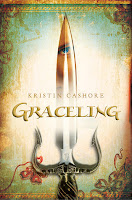Sometimes I have some things to say about a book, but not enough for a whole post. Enter mini reviews! This week I'm reviewing two young adult fantasy novels that, on the surface, have a lot in common: Passenger by Alexandra Bracken and Graceling by Kristin Cashore. Both have one-word titles. Both are the start of a series (but then what book isn't these days). And both were kind of a mixed bag. However, I think one was slightly more successful than the other. Read on to find out which!
Passenger by Alexandra Bracken
A gifted violinist, 17-year-old Etta Spencer is eagerly awaiting her professional debut concert. But her career and everything else in her life is put on hold when she's literally shoved through time and into Revolutionary-Era America. Trapped aboard a pirate ship, Etta has to figure out how to get back to her own time and save her mom.
I can never say no to a story about time travel, especially when it involves romance, so when I saw this book on Booktalk & More Too, I immediately requested it at my library. I definitely enjoyed reading Passenger, but there were some inconsistencies and issues that kept pulling me out of a story I desperately wanted to be sucked into.
I loved the beginning of Passenger, where we get a peek into the life of a child prodigy and witness Etta's passion for violin. It reminded me of Mozart In the Jungle, which is one of my favorite TV shows ever. I also liked that Bracken didn't completely whitewash the past and that Nicolas was black (that said, I would have liked it even more if he wasn't the only black person in the book). The story itself was perfectly paced and it's the type of book you don't want to put down.
Unfortunately, Passenger also has some major weaknesses in regards to plausibility and continuity that made it a frustrating read, especially in the second half. I'm not talking about the time travel aspect–I don't expect that to make sense, and it doesn't–but character motivation and practical details that the author skips over or makes a hash out of.
For example, when Etta first time travels, she gets "Traveler sickness" and is unconscious for several days, allowing Sofia to take her from the time portal and deposit her on a ship. Okay, fine. But how did Sofia get Etta from the portal to the ship? Did she have someone carry her? Fireman's hold? Wingardium Leviosa? Teleportation? I guess we'll never know.
Then there's the romance, which I simply did not feel at all. It's one of those romances where they're attracted to each other as soon as they lay eyes on one another, but then spend 500 pages not doing anything about it BECAUSE REASONS. And let me add here that the male half of this equation is a pirate. I found his behavior distinctly un-piratical.
Add to all that long-ass passages of really headslappingly stupid exposition ("Marrying up was the only way that any number of women in history had escaped their pasts and whatever stations they’d been born into. They couldn’t work to improve their lives the way men did, and live by their own means. It was grossly unfair to them–" Thanks for that), and descriptions that are just a bunch of words strung together in sentences that honest to god mean absolutely nothing, and I couldn't work up more than a like for this one. But, it's a decent and fun time travel story, and if you enjoy shows like Timeless you'll probably enjoy this read.
Graceling by Kristin Cashore
In an alternate world, Katsa is graced with a powerful fighting ability, which her cousin and king exploits to his own advantage. But when she meets similarly graced Prince Po, he inspires her to rebel and set out on an adventure.
Graceling is another novel with a well-told story, but some problems that prevented me from really getting into it.
When I was reading reviews of this book on Goodreads shortly after I started it, I noticed that some people were grouchy about "the raging feminist agenda." And, about halfway through, I understood why. Graceling makes a big show of being "feminist," with a heroine who literally kicks people's asses. But when there's only one female character (aside from a maid whose only purpose in the narrative is to make Katsa attractive so she can attract boys) and the book doesn't even pass the Bechdel Test, the feminist agenda feels more like patronizing lip service than empowerment. I got pretty damn cranky about the whole thing myself, I have to say.
I also was not into the romance between Kat and Po. I did like that they were equals and Po treated her as such, but for me personally it's hard to wrap my head around a positive relationship built on fighting. And the sex scene was like something out of a different novel. A bad one.
But! In the last quarter of the book Po is out of the picture, and I have to say Graceling improved by about 1000 percent. More female characters showed up–a princess, who while a little kid is pretty smart; a sea captain; Po's mom–and since Po's not around, Katsa can do what she does best: survive against the elements and baddies.
I probably won't read the second book in this series, but Graceling was okay. I'm glad I finally got around to finishing this book that's been on my shelf for years.
Discus this post with me on Twitter, FaceBook, Google+ or in the comments below.






















